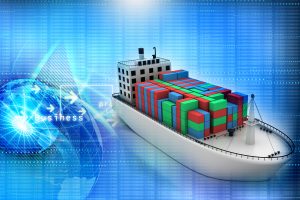Holy Crap! Maersk & IBM Team Up to Change International Shipping!
 Always seeming to be a step ahead of the competition, Maersk is at it again. The industry-leading ocean carrier is forming a joint venture company with IBM that could revolutionize the international shipping industry.
Always seeming to be a step ahead of the competition, Maersk is at it again. The industry-leading ocean carrier is forming a joint venture company with IBM that could revolutionize the international shipping industry.
The world’s largest container shipping firm A.P. Moller-Maersk is teaming up with IBM to create an industry-wide trading platform it says can speed up trade and save billions of dollars.
Technically, Maersk has already been working with IBM since 2016 on this blockchain-based platform technology.
Gavin van Marle wrote in an article on the Loadstar:
Maersk and IBM are taking their blockchain collaboration a step further, announcing today that they intend to form a joint-venture company based in New York to “commercialise” the technology.
“Blockchain technology powers the digital currency bitcoin and enables data sharing across a network of individual computers,” Gronholt-Pedersen clarifies. He goes on to write in his Reuters article:
Success of the platform, which will be made available to the ocean shipping industry around mid-2018, depends on whether Maersk and IBM can convince shippers, freight forwarders, ocean carriers, ports and customs authorities to sign up.
It’s hard to imagine shippers, freight forwarders, ocean carriers, ports, and customs authorities won’t sign up and make the platform successful.
For one thing, many such companies are already onboard.
The Loadstar article makes it clear that Maersk and IBM have a head start on convincing businesses to sign up, saying they’ve already got Agility Logistics as well as shippers General Motors and Procter & Gamble signed up to use the blockchain-based international shipping platform.
Not just that, but since Maersk and IBM started working on their joint block chain project in 2016, van Marle writes that DuPont, Dow Chemical, Tetra Pak, Port Houston, Rotterdam Port Community System Portbase, Customs Administration of the Netherlands, and US Customs and Border Protection have linked up to trial the platform. “In addition, Guangdong Inspection and Quarantine Bureau will connect to its Global Quality Traceability System for import and export goods,” van Marle reports.
More companies will likely jump onboard because this platform is a possible solution for a number of problems in the international shipping industry.
Shippers commonly complain about lack of transparency from carriers when it comes to their cargo shipments while carriers are also notoriously unreliable.
This platform offers better service from carriers to shippers through digital transparency while potentially significantly reducing delays that can be costly for both shippers and carriers.
Lucas Mearian gives a little bit of analysis of Maersk and IBM’s blockchain-based electronic shipping platform in an article on Computer World:
The new platform could save the global shipping industry billions of dollars a year by replacing the current EDI- and paper-based system, which can leave containers in receiving yards for weeks, according to the companies.
Blockchain will enable a single view via a virtual dashboard of all goods and shipping information for all parties involved, from manufacturers and shippers to port authorities and government agencies.
As an immutable, distributed ledger, blockchain technology will also improve security, according to Michael White, former president of Maersk Line in North America and CEO of the new company.
…
Blockchain’s native immutability as a distributed ledger will also create an automatic audit trail for regulators, something with which the industry has struggled.
Along with paper legal documents, much of the international shipping industry’s information has been transmitted via electronic data interchange (EDI) – a 60-year-old technology. But once shipping manifests move to API-based technology on the new platform, shippers and everybody else in the supply chain will have more timely information and improved visibility, White said.
The blockchain technology will employ smart contracts or self-executing workflows determined by the goods being shipped and the authorization they require while in transport.
“The key point is how do you eliminate or minimize delays and how can you shorten the time people are waiting for information or documentation for cargo to move efficiently,” White said.
…
While international shipping is a $4 trillion a year industry, and 80% of of the goods are carried on ocean vessels, much of the logistics involved in creating cargo manifests, tracking shipments and even getting sign-offs from customs and other port authorities remains a paper process.
As the cost and size of the world’s trading ecosystems continue to grow more complex, the cost of the required trade documentation to process and administer goods shipped globally is expected to reach one-fifth of the actual physical transportation costs.
According to The World Economic Forum, by reducing barriers within the international supply chain through transparent, electronic communications, global trade could increase by nearly 15%, boosting economies and creating jobs.
Yes, smart contracts or self-executing workflows mentioned by Mearian above would be forms of AI technology. And yes, AI technology and digitization through a digital platform are more examples of the 4th Industrial Revolution (4IR) hitting the international shipping industry.
Previous examples we’ve talked about in posts on this blog are automated cargo ships and electric semi-trucks.
Many have predicted the 4IR to disrupt shipping as this industry—typically behind the times in terms of technology—adapts to all the technological advances and changes on the horizon. However, this Maersk/IBM platform looks like it could quickly improve international shipping.
Of course, the pessimist could always point out the possibility of things going wrong. What could potential bugs in the system do? What happens if a cyber attack shut the platform down? Even as a separate company, would the platform give Maersk an unfair advantage in the industry?
Maersk and IBM still have to gain regulatory approval before their still-unnamed joint venture company can come into existence. However, we may not be waiting long for answers to questions about the joint venture as Gronholt-Pedersen writes in the Reuters article that the platform could be available to the shipping industry by the middle of this year.




